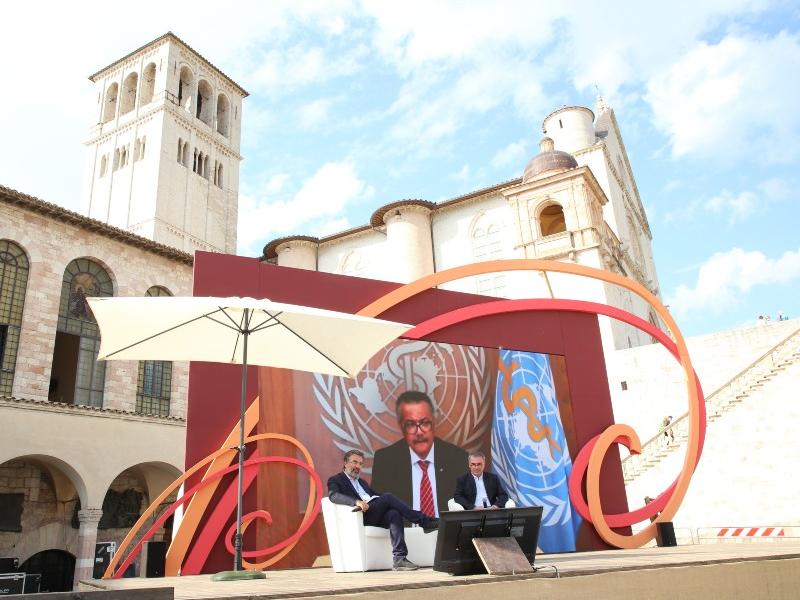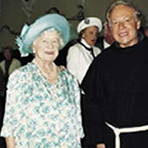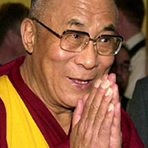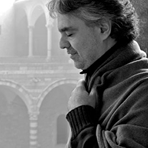Le visite dei pontefici


Father Enzo Fortunato,
My dear friends,
Buongiorno!
I would like to thank the Courtyard of Francis and the Pontifical Council for Culture for the opportunity to speak today. I’m delighted to be with you virtually, although I’m very sorry that I can’t be with you in person in Assisi at the magnificent Basilica of San Francesco. One of the many things COVID-19 has taken from us is the opportunity of being together. Modern technology is a wonderful gift, but there is simply no substitute for face-to-face interaction – to build friendships, to resolve conflicts and to address the major challenges of our time. That is exactly how WHO has been working to address the world’s health challenges for 72 years. The COVID-19 pandemic is the defining crisis of our age.
Eight months ago I declared a public health emergency of international concern – WHO’s highest level of alarm under international law. At the time there were less than 100 cases outside China, and no deaths. Now, more than 30 million cases have been reported to WHO, and soon we will reach 1 million deaths. But the impacts go far beyond the sickness and death caused by the virus itself. The social, economic and political consequences will be far-reaching and long-lasting.
For all the technological, economic and military might of nations, we have all been humbled by this virus. Every country has been affected, rich and poor, east and west, north and south. Italy was one of the first countries outside China to be affected. It was the worst-hit country in Europe at the beginning of the outbreak and learned painful lessons that many other countries have benefited from. I want to express my appreciation to Prime Minister Giuseppe Conte and the government and people of Italy, for the resilience and endurance with which you have confronted this crisis. I want to offer my profound condolences to Italy as a nation, and to each family that has lost someone they love. We grieve with you.
I also offer my deep thanks, admiration and respect for every nurse, doctor, paramedic, ambulance driver, hospital cleaner and everyone who put themselves in harm’s way to serve others. Italy took hard decisions based on the evidence and persisted with them, which reduced transmission and saved many lives. WHO is proud to have worked with Italy on a daily basis, creating mutual trust and confidence. Italy is a shining example that with national unity and solidarity, humility and community engagement, even the most severe situation can be turned around.
But these hard-won gains can easily be lost. The virus is still circulating, and most people remain susceptible. Like many countries in Europe, transmission is increasing in Italy again, and with winter approaching, schools reopening and people yearning to return to normal life, everyone must play their part to keep themselves and others safe. As I have said many times, the keys to defeating this pandemic are unity and solidarity. That is true in families, neighbourhoods and communities, and it’s true at the global level. When we act out of self-interest, we provide an opportunity for the virus to spread. When we act in solidarity, the virus can be stopped. Indeed, this pandemic has brought out the best and worst of humanity.
It has exposed and exploited the fault lines, inequalities, injustices and contradictions of our world. Nations have been drawn together, and driven apart. We have seen what is possible with cooperation, and what we risk without it. We have been reminded that for all our differences, humanity is one. We live in different countries, but we share the same planet. We speak different languages, but we share the same DNA. We have different faiths, but we share the same hopes and dreams for health and peace. Our interconnectedness is a great strength, but when it comes to the spread of disease, it is also a weakness.
The pandemic has shown that viruses don’t need visas, and that a global threat demands a global response. We need more international cooperation, not less. This year marks the 75th anniversary of the founding of the United Nations. The UN was born in the aftermath of the Second World War, as a platform for nations to come together to find shared solutions to shared problems, without resorting to weapons and wars. The UN has never been more important, and nor has it been more under threat. The forces of nationalism and isolationism threaten to tear us apart, if we let them.
Pope Francis has been adamant in his strong advocacy for peace, collaboration and equity. It’s the same message that was propounded by St Francis more than 800 years ago. Perhaps no crisis since the Second World War has demonstrated why we need the UN more than the COVID-19 pandemic. WHO was one of the first specialised agencies of the UN to be established, in 1948, on the conviction that health is a human right to be enjoyed by all people. That conviction is as strong now as it was then. We are all born equal. For 72 years, we have brought countries together to address shared health threats – even countries on opposite ends of the ideological spectrum.
At the height of the Cold War, the Soviet Union and the United States of America joined forces to conquer a common enemy: smallpox, one the greatest achievements in the history of WHO and global health. They recognized that viruses do not respect nations or ideologies. International cooperation has also underpinned many of the health gains the world has made in the past 20 years, including driving polio almost to the point of eradication, dramatically expanding immunization, and reducing maternal and child mortality and deaths from malaria and HIV.
In my own country Ethiopia, the gains we made would not have been possible without generous and sustained bilateral and multilateral support. That same sense of national unity and global solidarity is needed now more than ever to defeat COVID-19. Since the earliest days of the pandemic, WHO has brought countries together to identify and coordinate research priorities, to share information and experience, to mobilize resources, to address shortages of supplies and much more. We have also worked with countries to ensure that access to lifesaving vaccines, diagnostics and therapeutics does not become a contest that only the rich and powerful can win. Once a vaccine is available, it must be available equitably to all countries and to all people, irrespective of where they live and their social or economic status.
In April, WHO and the European Commission formed the Access to COVID-19 Tools Accelerator, to catalyse the development of, and equitable access to, vaccines, diagnostics and therapeutics. Together with partners we also established the COVAX Facility, which guarantees access to vaccines for at least 20% of the population of every participating country. As of Friday’s deadline, more than 170 countries have joined the COVAX Facility, including more than 80 high-income countries who have committed to subsidize the cost of vaccines for 92 low- and middle-income countries.
If and when we have an effective vaccine, we must also use it effectively. And the best way to do that is to start by vaccinating some people in all countries, rather than all people in some countries. This is not just the right thing to do, it’s the best way to ensure the global economic recovery. In our interconnected world, if people in low- and middle-income countries miss out on vaccines, the virus will continue to kill and the economic recovery will be delayed. A vaccine will not be a silver bullet, but it will be a vital tool for helping to bring this pandemic to an end.
But once it is over, we will still be left with the same inequalities and vulnerabilities we had before. Major gaps remain in the world’s preparedness for pandemics and other emergencies. Major discrepancies in life expectancy persist. Major health threats like antimicrobial resistance remain, as do major drivers of disease. And more than half the world’s population still lacks access to essential health services, like treatment for HIV and tuberculosis, basic sanitation, cancer screening, or the ability to see a health worker. Even when services are available, using them can mean financial ruin. Almost 100 million people are pushed into extreme poverty every year because of the costs of paying for care out of their own pockets.
The poorest and most vulnerable people are the most at risk, including women, children, migrants and refugees, older people and the disabled, who need tailored and integrated social and health support, which is very difficult to achieve even in the richest countries. These inequalities are not just a moral outrage, they also keep families, communities and nations trapped in cycles of disease and poverty. Addressing these challenges therefore demands the same level of urgency and international cooperation that is now being marshalled against COVID-19. The good news is that the international community has committed to addressing these challenges. In 2015, countries adopted the Sustainable Development Goals.
And at the World Health Assembly in 2018, countries adopted a 5-year plan for global health built on what we call the “triple billion” targets: 1 billion more people benefitting from universal health coverage; 1 billion more people better protected from health emergencies; 1 billion more people enjoying better health and well-being. These are the targets the world needs to achieve by 2023 to get on track and stay on track for the Sustainable Development Goals. There is no doubt that the pandemic is a setback to our efforts to achieve the Sustainable Development Goals and the “triple billion” targets. But that doesn’t mean we should give up. Quite the opposite; we must use this moment to renew our focus and our commitment to achieving them.
The pandemic has demonstrated the intimate links between each of the “triple billion” targets. Our first priority must be to keep people healthy and out of hospitals, by addressing the root causes of disease in the air people breathe, the food they eat, the water they drink and the environment in which they live and work. But when people do need health services, countries have a duty to ensure those services are accessible, affordable and high-quality. And just as many countries invest in their military capacity in case of conflict, so they must invest in robust public health capacities to prepare for, prevent, detect and respond rapidly to outbreaks when they occur. In recent years, many countries have made enormous advances in medicine, but too many have neglected their basic public health systems, which are the bedrock for preventing, preparing for, detecting and responding to outbreaks.
Italy is among the very few countries where health is a constitutional right and its health system is truly universal and free. This has clearly contributed to its successful fight against COVID-19. However, the resurgence of the virus indicates that the war is not over yet and we must stand united. Investments in disease surveillance and monitoring, health promotion, water, sanitation and hygiene, educating and empowering communities and building a strong health workforce are essential for building resilient public health systems. The absence of any one of these leaves communities vulnerable and undermines the timely response necessary to contain outbreaks.
Ultimately, the best defence against the impact of outbreaks and other health emergencies is a strong health system, built on primary health care with an emphasis on promoting health and preventing disease. That’s why universal health coverage is WHO’s top priority. And here too, the world has come together with unprecedented political commitment. At the United Nations General Assembly last year, world leaders adopted the high-level political declaration on universal health coverage. This is the first time that the nations of the world have committed to the idea that no one should miss out on health services simply because they are poor.
===
These priorities have much in common with the values of St Francis of Assisi. As St Francis said, “Blessed is the servant who loves his brother as much when he is sick and useless as when he is well and can be of service to him.” Health and healing were central to the life and work of Jesus Christ, and they have been central to the life and work of churches ever since. Franciscan orders have established hospitals and other care facilities all over the world. Today, churches and faith-based organizations remain major providers of health care, especially for poor and marginalized people. Across Sub-Saharan Africa, churches provide between 40 percent and 60 percent of health care, and provide significant training for health workers. As places of community and solidarity, churches and other faith-based institutions can play a vital role in promoting and protecting health. Faith leaders carry a voice of authority that sometimes speaks louder than that of governments and other leaders.
===
My brothers and sisters,
Last century, the horrors of two world wars gave birth to the realization that international cooperation is preferable to international conflict. My hope is that the suffering the world is now enduring will not be in vain. My hope is that the defining crisis of our age will likewise remind all people that the best way forward – the only way forward – is together. The pandemic is teaching us valuable lessons. It’s reminding us that none of us are safe until all of us are safe; That a healthier world is a safer world; And that health is not a cost, it’s an investment in our common future.
The need for international cooperation has never been more important. And the prayer of St Francis has never been more relevant, for people of all faiths and none. Where there is hatred, we must sow love. Where there is despair, hope. Where there is darkness, light. For it is in giving that we receive. I thank you.
Cari amici la rivista San Francesco e il sito sanfrancesco.org sono da sempre il megafono dei messaggi di Francesco, la voce della grande famiglia francescana di cui fate parte.
Solo grazie al vostro sostegno e alla vostra vicinanza riusciremo ad essere il vostro punto di riferimento. Un piccolo gesto che per noi vale tanto, basta anche 1 solo euro. DONA


